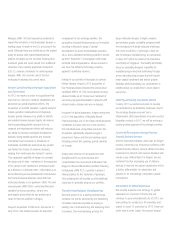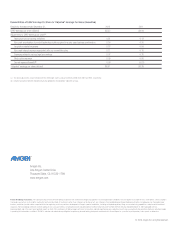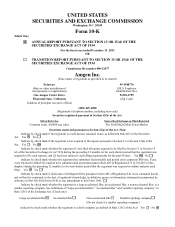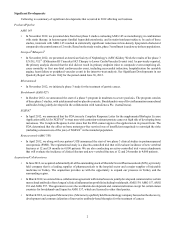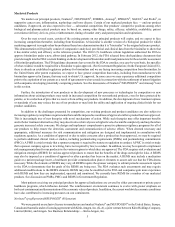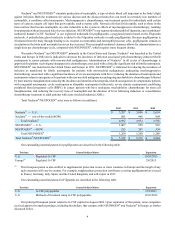Amgen 2012 Annual Report Download - page 2
Download and view the complete annual report
Please find page 2 of the 2012 Amgen annual report below. You can navigate through the pages in the report by either clicking on the pages listed below, or by using the keyword search tool below to find specific information within the annual report.illnesses, AMG 145 has tremendous potential to
impact the incidence of cardiovascular disease, a
leading cause of death in the U.S. and around the
world. Although there are medicines on the market
today for people with hypercholesterolemia,
millions of people are not currently meeting their
treatment goals and could benefit from additional
reduction of low-density lipoprotein cholesterol
(LDL-C), a known contributor to cardiovascular
disease. AMG 145 could be one of the first
molecules to address this unmet need.
Greater Combined Value through Acquisitions
and Partnership
In 2012, we made a number of acquisitions that
improved our discovery research capabilities and
advanced our global expansion efforts. The
acquisition of deCODE Genetics, a global leader in
human genetics, headquartered in Reykjavik,
Iceland, greatly enhanced our ability to identify
and validate human disease targets. We believe
that incorporating genetic research into our
research and development efforts will enhance
our ability to develop meaningful therapies for
patients. Using detailed genetic and medical
information from hundreds of thousands of
individuals, deCODE has discovered key genetic
risk factors for dozens of common diseases
ranging from cardiovascular disease to cancer.
This expanded capability at Amgen to correlate
two large sets of data—variations in the sequence
of the genome and variations in phenotype (such
as a disease or a physical trait)—will enable us to
more efficiently pursue development of molecules
that combat serious illnesses. Given that two
molecules already in our pipeline—AMG 145 and
romosozumab (AMG 785)—were identified and
validated by human genetics, we are very
enthusiastic about what we can achieve as a
result of this new addition to Amgen.
Amgen’s acquisition of Micromet, announced in
early 2012, has already become an important
complement to our oncology pipeline. The
acquisition included blinatumumab, an innovative
oncology molecule in phase 2 clinical
development for acute lymphoblastic leukemia
(ALL), and a validated technology platform known
as BiTE® (bispecific T-cell engager) with broad
potential clinical applications. We are excited to
see how this antibody technology could be
applied to additional cancers.
Adding to our portfolio of therapies to combat
kidney disease, Amgen’s 2012 acquisition of
KAI Pharmaceuticals included the lead product
candidate AMG 416. This novel peptide is being
studied initially as an intravenous treatment of
secondary hyperparathyroidism in patients with
chronic kidney disease who are on dialysis.
In support of global expansion, Amgen announced
in 2012 the acquisition of Mustafa Nevzat
Pharmaceuticals, one of the oldest pharmaceutical
companies in Turkey and one of the country’s
first manufacturers of injectable products. The
acquisition significantly expands Amgen’s
presence in Turkey and the surrounding region,
including several fast-growing, priority markets
for Amgen.
Amgen also entered into an agreement with
AstraZeneca Plc to jointly develop and
commercialize five monoclonal antibodies from
Amgen’s clinical inflammation portfolio including
brodalumab (AMG 827), currently in phase 3
clinical studies for the treatment of psoriasis.
This collaboration will provide us with additional
resources to optimally advance our portfolio.
Transforming Biologics Manufacturing
We have grown to be a leading biotechnology
company not just by discovering and developing
innovative molecules but also by playing a
leading role in manufacturing and delivering them
to patients. The manufacturing process for
large-molecule biologics is highly complex
and contains greater variability compared with
the manufacture of small molecule medicines
that come in pill form. Continuing to lead the
way in biologics manufacturing, we announced
in early 2013 plans to construct an innovative
new facility in Singapore. The facility will initially
focus on expanding Amgen’s capability for
manufacturing monoclonal antibodies through
a new manufacturing process that will require
lower capital investment and deliver greater
flexibility while maintaining our commitment to
reliably deliver our medicines to every patient,
every time.
Entering a Growing Biosimilars Market
In early 2013, we announced plans to develop
and manufacture six biosimilar molecules: four in
the oncology disease area and two in
inflammation. With expectations to launch our first
biosimilar product in 2017, we will be entering a
rapidly growing segment of the biologics market.
Further Differentiation through Patient-
Friendly Delivery Devices
Another important initiative under way at Amgen
involves combining our innovative medicines with
patient-friendly delivery devices. While innovative
medicines for patients with serious illnesses will
remain a key differentiator for Amgen, we are
confident that the increasing use of delivery
devices to improve the patient experience will be
a further differentiator for physicians and
patients in an increasingly competitive global
marketplace.
Momentum in Global Expansion
We recently advanced our strategy for global
expansion on a number of fronts and will
continue to grow internationally. As of 2012, we
were selling our products in 56 countries and
expect to reach 75 countries by 2015. Plans are
under way to enter Japan, the second-largest


